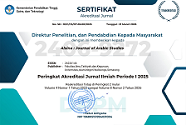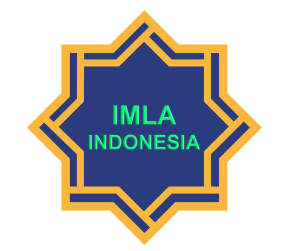Pengembangan Buku Ajar Keterampilan Menulis Bahasa Arab Berbasis Kearifan Lokal Sebagai Penunjang Kreativitas Mahasiswa
DOI:
https://doi.org/10.21580/alsina.1.2.5056Keywords:
kearifan lokal, kreativitas, menulis Bahasa ArabAbstract
Basic Arabic writing skills are included in the competency-based curriculum and conservation of the Arabic Education Study Program. Learning basic Arabic writing skills is provided through the taroqib wa takhawiljumal course. Learning basic Arabic writing skills, based on local wisdom, introducing our nation's culture and increasing students' creativity in writing Arabic. The research subjects were students who took taroqib wa takhawiljumal totaling 30 people, data collection methods used in this study included (1) potential and problems, (2) data collection, (3) product design, (4) design validation, (5) design revision. Learning basic Arabic writing skills based on local wisdom introduces students to their culture, creative in writing Arabic, and encourages to better written language.
Downloads
References
Arikunto, Suharsimi. 2006. Prosedur Penelitian, Suatu Pendekatan Praktek. Jakarta: PT. Rineka Cipta.
______2010. Prosedur Penelitian Suatu Pendekatan Praktik. Jakarta: PT. Rineka Cipta.
Dahar, R.W. 1988. Teori-Teori Belajar. Jakarta: Depdikbud
Echols, John M. & Shadily, Hasan. 1995. Kamus Inggris-Indonesia: An English-Indonesian Dictionary. Jakarta: Penerbit Gramedia.
Eggen, P.D & Kauchak, P.P.. 1996. Strategies for Teacher: Teaching Content and Thingking Skill. Boston: Alyn & Bacon.
Hanafiah, Nanang dan Cucu Suhana. 2012. Konsep Strategi Pembelajaran. Bandung: PT Refika Aditama.
Isjoni, H. 2011. Pembelajaran Kooperatif Meningkatkan Kecerdasan KomunikasiAntar Peserta Didik. Yogyakarta: Pustaka Pelajar.
Moleong, J. Lexy. 1995. Metodologi Penelitian Kualitatif. Bandung: Penerbit Remaja Rosdakarya.
Nasution, S. 2003. Asas-asas Kurikulum. Jakarta : Bumi Aksara.
Nazir.2005.Metode Penelitian. Bogor: Ghalia Indonesia.
Nur, Muhammad. 2005. Pembelajaran Kooperatif. Departemen Pendidikan Nasional Direktorat Pendidikan Dasar dan Menengah Lembaga Penjamin Mutu Jawa Timur.
Nurhadi, dan Senduk, A. G. 2009.Pembelajaran Kontekstual. Surabaya: PT. JePe Press Media Utama.
Rusman. 2012. Model-Model Pembelajaran Mengembangkan Profesionalisme Guru. Jakarta: PT Raja Grafindo Persada.
Sukmadinata, Nana Syaodih. 2007. Metode Penelitian Pendidikan. Bandung: PT. Remaja Rosdakarya Offset
Downloads
Published
How to Cite
Issue
Section
License
Copyright
The copyright of the received article shall be assigned to the publisher of the journal. The intended copyright includes the right to publish the article in various forms (including reprints). The journal maintains the publishing rights to published articles. Authors are allowed to use their articles for any legal purposes deemed necessary without written permission from the journal, but with an acknowledgment to this journal of initial publication.
Licensing
In order for Alsina: Journal of Arabic Studies to publish and distribute research articles, the editors need publishing rights (transferred from author to publisher). This agreement relates to the transfer/publishing copyright license to Alsina: Journal of Arabic Studies but the authors still have significant rights to use and share their published articles.
Alsina: Journal of Arabic Studies supports the need for writers to share, disseminate and maximize the impact of their research and their rights on any database. As a journal article writer, you have the right to various uses of your articles, including that by the institution or company where you work. Copyright can be used without the need for special permission. Authors who publish articles in the Alsina: Journal of Arabic Studies have broad rights to use their work for teaching and scientific purposes without requesting permission, including:
- Use by the author for lectures, presentations, or conferences, with distribution of copies to participants;
- Distribution to colleagues for research use;
- Use in compilations of the author's subsequent work;
- inclusion in a thesis or dissertation;
- Reuse of sections or excerpts from articles in other works (with full acknowledgment of the final article);
- Preparation of derivative works (other than commercial purposes) (with full acknowledgment of the final article);
- Voluntary posting on open websites operated by authors’ or writers' agencies for scientific purposes
When submitting a manuscript, authors do so on the understanding that if accepted for publication, the copyright for publishing (publishing right) of the article shall be assigned/transferred to Alsina: Journal of Arabic Studies.
Authors whose articles are accepted for publication will receive confirmation via email and sent a Copyright Transfer Agreement.


 Accreditation
Accreditation 
 In Collaboration with
In Collaboration with 

 Visitors
Visitors  Article Template
Article Template





